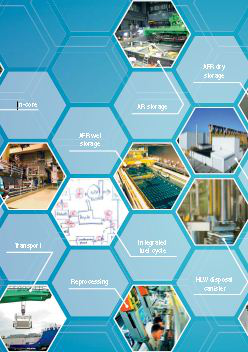Speaker
Marissa Bailey
(U.S. Nuclear Regulatory Commission)
Description
The OECD Nuclear Energy Agency (NEA) assists member countries in ensuring the adequate safety of existing and future nuclear installations, through maintaining and developing the knowledge, competence and infrastructure needed to regulate and support the complete life cycle. NEA’s Working Group on Fuel Cycle Safety (WGFCS) brings together representatives of regulatory bodies, their technical support organisations, and operators of nuclear fuel cycle facilities, which comprise of interrelated activities, including: uranium mining and milling; uranium refining and conversion to uranium hexafluoride; uranium enrichment; fuel fabrication and storage; spent fuel storage; spent fuel reprocessing; decommissioning of nuclear facilities; radioactive waste management and disposal options (including for spent fuel); and the research and demonstration facilities that support these activities. This paper discusses current WGFCS activities in the area of spent fuel and high-level waste (HLW) management.
Consistent with its mandate, the WGFCS, in cooperation with the NEA Working Group on Fuel Safety, held a workshop on the safety of long term interim storage (LTIS) facilities in Munich, Germany, in May 2013. The workshop covered national approaches, safety requirements, regulatory framework and implementation issues, technical issues, operational experience, and research and development for LTIS.
As follow-on to recommendations from the workshop, and recommendations from NEA’s Committee on the Safety of Nuclear Installations, the working group is developing a Technical Opinion Paper (TOP) that will gather information presented at the workshop. This information will be complemented by information supplied by WGFCS members to develop a picture of the current status of LTIS in NEA member countries.
The TOP will provide an overview of LTIS requirements and technical needs, based on approaches in member countries. The TOP will focus on: national approaches and expectations for LTIS management of spent fuel and HLW; spent fuel and HLW inventories and storage systems, and long term strategies being considered; regulatory framework, policies and regulations; licensing processes and procedures; knowledge, data and regulatory gaps and challenges, and national programs to address them; Identification of needs for research and development; and considerations of lessons learned from the Fukushima accident.
The task will not duplicate ongoing technical activities (e.g. by the International Atomic Energy Agency, the Electric Power Research Institute, the U.S. Department of Energy). Rather, the working group will coordinate with these organizations and provide a compilation and analysis of the member countries’ position on long term interim storage, licensing requirements and gap identification.
Country/ int. organization
OECD Nuclear Energy Agency
Author
Marissa Bailey
(U.S. Nuclear Regulatory Commission)

